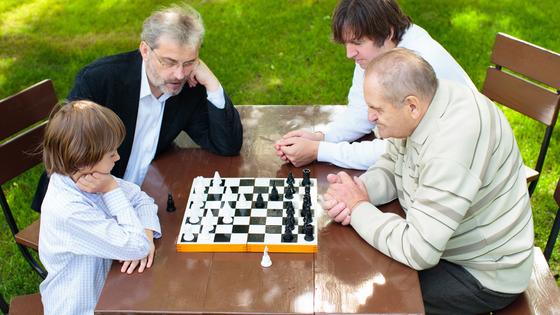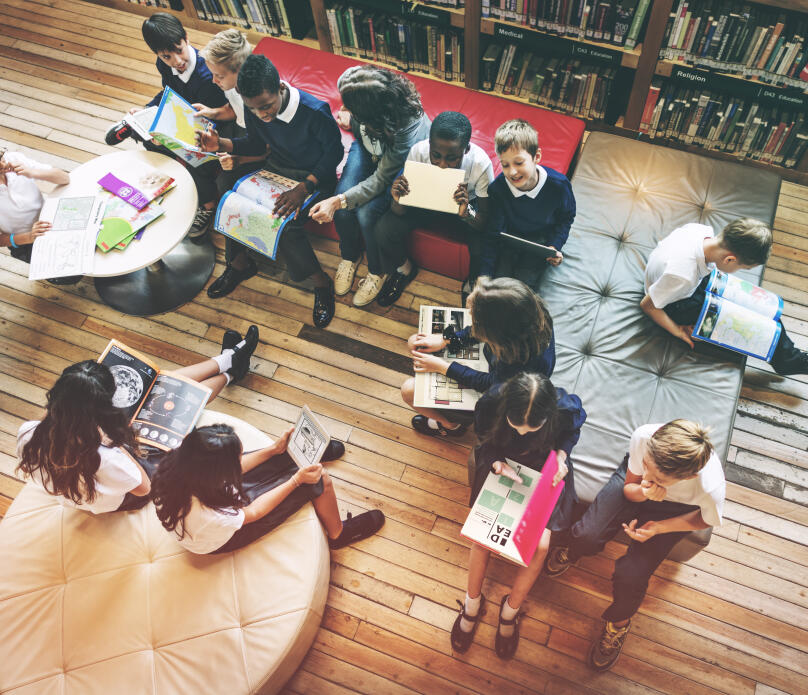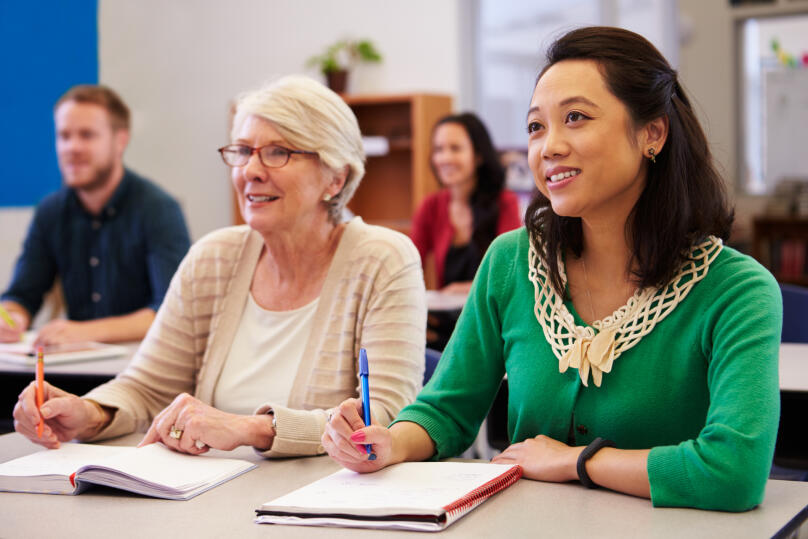Learning at Different Ages: from Childhood to Adulthood
We absorb new information in different ways at different ages. Learning depends upon both the state of our health status, brain activity, and also our psychological state of mind. Then there’s the widely held misconception that adults have more trouble learning than children, and older people learn with more difficulty than adults.

The truth, however, that it's not that our abilities that deteriorate during the course of our lives, but what we spend our time doing, our ability to concentrate, and the amount of free time we have on our hands.
Let's examine what's special about the human psyche at different ages and how we should structure our learning process taking into account all the nuances.
The brain is divided into lateral and logical areas. During childhood, the lateral area is formed, therefore, it's important to learn how to communicate with people at this age. To do that, adults demonstrate that they understand their baby's signals. During the development of the logical area, the lateral one gets blocked. The two brain areas don't work together. During teenage years, the development of the lateral area is completed, and the logical part of the brain is still forming one. Therefore, a teenager finds it increasingly difficult to focus on textbooks immersing more and more in his/her fantasies or the Internet. The older the person gets, the more it's only the logical brain area that works. An adult acquires knowledge by setting goals, therefore, his or her learning process is different from that of a teenager, and even more so from a child.
Children

Before going to school, children learn about the world around them through play. Therefore, at playgroup or other preschool institutions, children acquire new knowledge by playing with their nursery teachers and other children. Children have fun playing and, therefore, enjoy the learning process. If parents and nursery teachers, knowing the specifics of preschool children, teach them using educational toys, role play and physical games, children can learn anything from reading to new languages.
When children start going to school, they're fully open to everything new. Everything changes dramatically for them at school: the child moves from the "playing" process to the "learning" one. Learning requires a child to be more focused, responsible and engaged.
Children want to feel "part" of their parents; they need to have a sense of closeness, community and belonging to the adult world. The school education process is intentionally built to support a child's desire for authority: such role models at home are the child's father and mother, the nursery worker at the playgroup, then teachers and learning support assistants at pre-school, and then school. For a child learn school subjects easily, the teachers' authority must be unquestionable. A teacher needs to be fair, patient and kind. Moreover, it's important for parents to encourage their children at home, and praise their offspring as often as possible even for their minor successes.
Children find it harder to concentrate. This is the reason why the learning process is divided into 40-45-minute lessons at schools. The same principle applies to other things, such as dancing, music, painting, sports. Children should not be overloaded with studies or do one and the same thing for too long. Lessons should be diverse and use not only children's auditory perception (as in the lecture format), but also the sense of smell, touch and speech.
Children are like sponges soaking up new information and skills at an astonishing rate. New knowledge comes easily to a child, when he or she is fully open to the world, has not yet experienced failure or encountered evil or injustice. If a child has already developed any fears, they can be handled with a psychologist's help.
Teenagers

Teenage years are the time when children change from feeling that they're part of their parents to feeling that they belong to themselves. Teenagers start their quests for identity and push the boundaries of the permissible. At that age, they need more personal space and discretion. Parents decide which classes their young children should attend, whereas teenagers can decide for themselves about whether to change their old interests to new ones or not. The process of growing up implies the rejection of everything old and familiar in favour of the new and unknown, and all uncharted waters require courage and strength of spirit to discover.
A teenager's self-esteem is much lower than that of a child. Children are praised and encouraged, whereas teenagers usually get criticised and scolded: parents become more demanding of them, press them to study for their exams and decide as soon as possible, which university they want to go to after school. Furthermore, the challenging process of going through puberty and the burning desire to attain acceptance and kudos amongst their peers are further added stresses for teenagers. Moreover, it's a huge challenge for teenagers to focus on their studies when there are so many other distractions. For example; social media.
How can you study under such circumstances?
- Find yourself a new goal in studies. Whereas a child studied because they were interested in the adult world, it's highly likely that a teenager is more interested in themselves or their peers. To enter the "cool guys'" world, to become like them, a teenager may learn to play the guitar / programming / or to learn a new language like speak Japanese. New social groups a teenager want to be part of can be a good incentive for him/her to learn something new.
- Explore. Growing up, we tend to give up our childhood hobbies, however, if we don't replace them by taking up new ones the chances are that teenagers, we'll quickly get bored. Remember, there's nothing wrong with trying different things, constantly enrolling in online courses, giving them up and enrolling again. It's a natural process of search and self-understanding for a teenager.
- Use the Internet extensively. Even if a teenager studies offline only, they can use the Internet to gain additional information that's never taught at school.
Adults

It's not just turning 18 years old that makes a person an adult. Adulthood, of course, is about learning to make mature carefully weighed up decisions and be responsible for your actions. The logical part of the brain works objectively: adults' study because they need it, rather than with a view of earning the approval of their parents, teachers or peers.
As opposed to children and teenagers, an adult:
- has a conscious approach to learning;
- is able to learn on his/her own and prioritise;
- use learning to achieve their goals or resolve specific problems;
- strives to use the knowledge gained;
- uses personal experience in their studies.
Adults are more prone to boredom during their studies because they often believe they have already experienced and learnt a lot. It's not easy to remain as interested in the world and as eager to gain knowledge from it as when you were a child because when you're an adult you have many other responsibilities, living in the rat race and having to pay the bills and feed your family.
Although many bodily functions gradually deteriorate with age (our vision and hearing grow weaker, our memory and cognitive ability deteriorates (we start having trouble memorizing and taking in new information), the learning abilities of adults (aged from 20 to 60) don't change. If an adult is engaged in mental work, their learning ability remains intact much longer. Simultaneously, adults tend to grab a lot of training courses the same way they fill up their shopping baskets at a supermarket, and not to complete even half of them. The biggest problem adults have is motivation.
What's the best method of learning for adults?
- Set yourself realistic goals. Use SMART criteria: Specific, Measurable, Achievable, Realistic, and Time-bound. If the training course a person is signing up to has a clearly defined goals, which are realistic and achievable then the chances of success increase exponentially. For example, to 'write an article,' 'create your own chatbot,' then it'll become more interesting and easier for an adult to successfully complete such a course.
- Use your studies to be helpful to others. I f you can't understand why you should study, think about those who would find your new skills useful. It can be your partner, children, grandchildren or parents.
- Focus. Adults, just like teenagers, tend to let their attention wander and can get distracted. When you want to focus on your studies, go to another room or even to your office, isolate yourself from your household and parenting chores. Explain to your family that they should not distract you while you are studying.
- Praise yourself. An adult, unlike a child, is rarely encouraged by others. Buy yourself goodies, new books, reward yourself with a fun trip to celebrate the completion of a course.
The main thing to remember is that no matter how old you are, the world is now changing faster than it has ever changed before. Lifelong learning is now very popular, and in a fast evolving technological, global, world - it's not the trend that people are and will be learning all their lives - constantly needing to move with the times to learn and hone the new skills that will become essential in the twenty first century. The sooner we realise it, the easier it will be for us to set ourselves to a non-stop learning mode and to find new things to learn and the reasons to do it.
Share this with your friends via:
Latest News

In the UK, £23 million has been allocated for the expansion of the EdTech Testbed program — pilots of educational technologies in schools and colleges.

In the US, Tuskegee University announced the launch of Tuskegee University Global Campus (TUGC) — a new online platform for distance learning.

A significant stage in the development of the alternative education system has begun in West Northamptonshire in the UK: the County Council is actively calling on parents, guardians, and trustees to participate in shaping the future of this key area.

Outwoods Primary School in Atherstone, Warwickshire, having experienced deep sadness after the loss of their famous cat, Silla, has found solace in a new pet – a Maine Coon named Aloysius O’Hara.

In modern universities, artificial intelligence, and in particular ChatGPT, is rapidly transforming from a controversial tool into a full-fledged student assistant.












 Spring skills audit: what to remove, strengthen, and “sow” in learning
Spring skills audit: what to remove, strengthen, and “sow” in learning
 9 Career Mistakes Young Professionals Make
9 Career Mistakes Young Professionals Make
 £23 million allocated for the expansion of EdTech Testbed in the UK
£23 million allocated for the expansion of EdTech Testbed in the UK
 Test: How Psychologically Mature Are You? Check Your Inner Foundation.
Test: How Psychologically Mature Are You? Check Your Inner Foundation.
 Test. Check Your Social Media Dependency Level!
Test. Check Your Social Media Dependency Level!
 Test: What Business is Right For You?
Test: What Business is Right For You?
